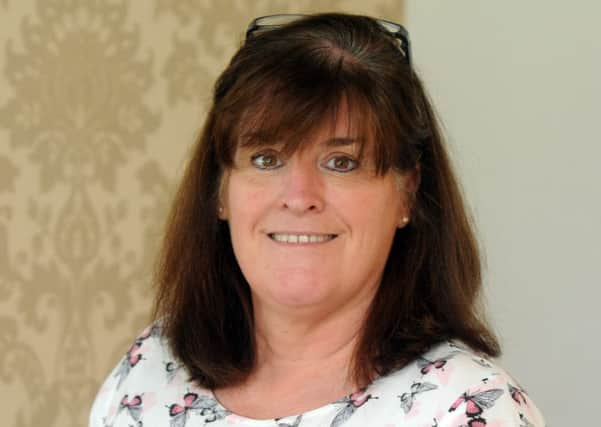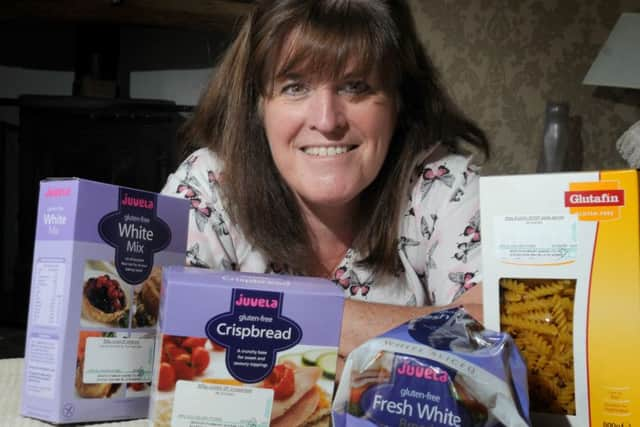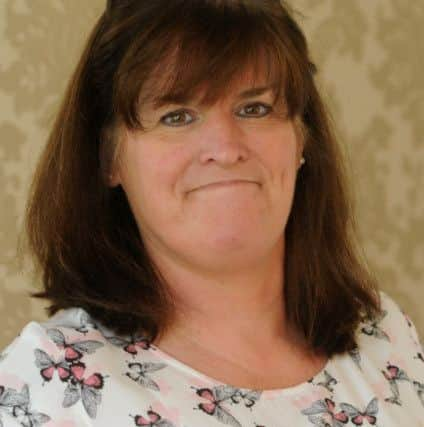Mum warns anaemia could be first sign of coeliac disease


GILL Stubbs lived with severe pain, abdominal discomfort and even suffered a miscarriage and fertility issues before she was finally diagnosed with coeliac disease.
And it was when she went to give blood and was rejected as a donor for being severely anaemic that was the first real sign that led to her GP sending her for investigations which culminated in her diagnosis.
Advertisement
Hide AdAdvertisement
Hide AdGill, 50, who lives in Croston, near Preston, and is married to Karl, explains: “From around the age of 18 onwards, I suffered from terrible bloatedness and had severe abdominal pain and tiredness.


“Some days I would be constipated, other days I would have diarrhoea.
“I went to see a clinician and they did not test me for anything.
“As I was young and healthy in every other way, they put it down to Irritable Bowel Syndrome (IBS).
“It went on for years and I just learned to live with it.


Advertisement
Hide AdAdvertisement
Hide Ad“However, I did notice that my symptoms were worse whenever I had fibre.”
When Gill and her husband decided they wanted to have children, Gill realised she had fertility issues.
She went to see a specialist who told her she had ovarian failure and was only producing one egg every three years.
Just as Gill was about to start the process of IVF, she became pregnant naturally and her son Thomas, now 16, was born in 1999.


Advertisement
Hide AdAdvertisement
Hide AdAfter the delivery, doctors noticed Gill’s haemoglobin levels had dropped very low and she had to have two blood transfusions. However, at the time, it was just thought to be down to the birth.
But a year later, Gill went to give blood and was told that she couldn’t donate as she was anaemic and was asked if she had any other symptoms.
Gill recalls: “I was exhausted and had been getting some heart palpitations. I went to my GP and her referred me to a gastroenterologist.”
Gill underwent a number of tests including coeliac screening – but this turned out to be negative, which can happen.


Advertisement
Hide AdAdvertisement
Hide AdGill then had a biopsy of the small bowel and the results of this showed she had coeliac disease.
Gill, who is practice manager at Croston Village Surgery, suffered a miscarriage not long after that and went into premature menopause.
However, at the age of 40, she became pregnant naturally once again with daughter Hollie, now 10, even though she had started the menopause.
It is only now that Gill realises her issues with fertility and the miscarriage were all connected to the coeliac disease.
Advertisement
Hide AdAdvertisement
Hide AdOne in 100 people in the UK has coeliac disease while current research indicates that only 24 per cent of those with the condition are diagnosed, leaving an estimated half a million people in the UK struggling with undiagnosed coeliac disease.
Undiagnosed coeliac disease can lead to a number of complications including osteoporosis, fertility problems and in rare cases small bowel cancer if left untreated.
The charity Coeliac UK is focused on exposing the link between anaemia and undiagnosed coeliac disease as it hunts for the missing half a million people with coeliac disease.
Sarah Sleet, chief executive of Coeliac UK, the national charity for people with coeliac disease, says: “Recurring or unexplained anaemia is a key symptom to help in the search for those with undiagnosed coeliac disease.
Advertisement
Hide AdAdvertisement
Hide Ad“These people are probably suffering in silence taking supplements and worrying about what’s causing their anaemia off and on for years when a simple blood test for coeliac disease might just reveal the answer and change their life for the better forever.”
Gill says that the first real sign of her having coeliac disease was the anaemia but thinks things would have been very different if her condition had been discovered earlier.
She explains: “As my coeliac disease went undiagnosed for so long, by the time it was discovered, the damage had already been done to my bowel and, as a result, my body has not been able to absorb vitamin B12.
“I have to have vitamin B12 injections at my GP surgery every three months and also have to take vitamin D as a tablet.
Advertisement
Hide AdAdvertisement
Hide Ad“I have my bloods checked yearly and also see a dietician at the hospital.
“With the help of Coeliac UK, I follow a completely gluten free diet and it has made a huge difference.
“I feel a lot healthier and have more energy and my iron levels are completely normal now.
“If I accidentally eat something with gluten in it, I always know within hours as I feel nausea and get horrendous stomach pains and feel low and lethargic.
Advertisement
Hide AdAdvertisement
Hide Ad“Things are changing for the better when it comes to coeliac disease as most GPs are now routinely screening for coeliac when people come in with bowel and digestive problems.
“However, there are still hundreds of people out there who are undiagnosed.
“My advice to people is to get checked out for coeliac disease if they have anaemia, particularly if they have other symptoms as well.
“If your symptoms persist after a negative blood test for coeliac disease, they recommend a biopsy.
Advertisement
Hide AdAdvertisement
Hide Ad“I do feel that if I had been diagnosed earlier, things would have been a lot different.”
FACTFILE
• Being anaemic most commonly describes a person with low levels of iron in their blood known as iron deficiency anaemia.
• There are other forms of anaemia associated with undiagnosed coeliac disease linked to low levels of vitamins in the blood, low levels of vitamin B12 or low levels of another B vitamin folic acid.
• Anaemia is generally identified by having a blood test and should be checked out by a healthcare professional to determine its cause.
Advertisement
Hide AdAdvertisement
Hide Ad• Although not everyone with coeliac will experience them, other symptoms of coeliac disease may include frequent bouts of diarrhoea, stomach pain and cramping, regular mouth ulcers, ongoing fatigue, lots of gas and bloating, nausea and vomiting.
• Coeliac disease is not an allergy or an intolerance but a serious autoimmune disease where the body’s immune system damages the lining of the small bowel when gluten, a protein found in wheat, barley and eye is eaten.
• There is no cure or medication for coeliac disease; it is a life long condition for which the only treatment is a strict gluten-free diet for life.
• Although the gluten-free diet is the only treatment for the condition, it is essential no one removes gluten from their diet until the full diagnosis has been completed as you have to be consuming it every day for six weeks to ensure accurate blood test results.
Advertisement
Hide AdAdvertisement
Hide Ad• Gluten is a protein found in wheat including spelt, eye and barley. Some people are also sensitive to oats. Obvious sources of gluten include breads, pastas, flours, cereals, cakes and biscuits. It is often used as an ingredient in many foods such as fish fingers, sausages, gravies, sauces and soy sauce.
• The average time for a diagnosis of coeliac disease is 13 years.
• One in four people diagnosed with coeliac disease had previously been diagnosed with IBS.
• Coeliac UK has a helpline on 0333 332 2033. For more information visit: www.coeliac.org.uk